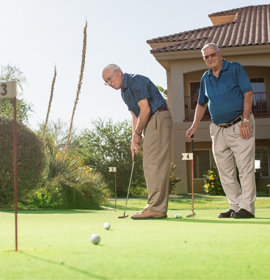9 Unexpected Energy Boosters for Older Adults

Post date: 1/4/2023
When most people think of “energy boosters,” they think of coffee, energy drinks and other caffeine-containing products. While the jury’s out on the merits of caffeine, relying on it for daily energy can certainly create haphazard peaks and valleys in your energy levels.
Fortunately, there are plenty of better, more sustainable strategies for staying alert and vibrant as you age. Here are nine great ways older adults can keep themselves healthier and more energetic.
1. Proper Nutrition
A well-balanced diet is essential to consistent energy levels. Too few calories, and you’ll feel lethargic and irritable; too many, and you’ll feel bogged down. The vitamins and minerals obtained from a wide variety of foods are also essential in supporting all of your body’s regenerative processes.
In general, eating smaller meals more frequently is better for consistent energy levels than splurging on a couple of big meals per day. Most meals should contain a combination of lean protein, vegetables, complex carbohydrates and healthy fats, all of which will help you feel full, satisfied and energetic without overeating.
2. Eating Breakfast
Breakfast is particularly important to maintain energy throughout the day. Even if you don’t feel hungry in the morning, it’s best to eat at least a small snack that contains eggs, cottage cheese or some other type of lean protein.
3. Green Tea
If you’re trying to kick a coffee habit, or if you just don’t tolerate large amounts of caffeine, green tea may be a better option. It still contains some caffeine — about a third of what you get in a cup of coffee — but it also has antioxidants, digestive benefits and amino acids that improve focus and mental clarity.
4. B Vitamin Supplements
B vitamins — B6 and B12 in particular — are excellent energy boosters. In fact, they’re found in plenty of popular energy drinks. Fortunately, you don’t need to down all that caffeine to reap B-vitamin benefits. Most well-balanced diets provide an abundance of B-vitamins, but if you need an extra boost, a simple B-vitamin complex may work wonders.
5. Drinking Water
Your body has amazingly adaptive mechanisms for regulating thirst and hydration, but these mechanisms tend to deteriorate as you age. Even mild dehydration can sap your strength and energy, however, so it’s important to drink water throughout the day — even when you don’t feel very thirsty.
6. Magnesium
Magnesium is a critical nutrient that your body uses to turn food into ATP — the cellular energy your body needs for movement, thought and even basic metabolic functions. It can be tough to get enough through diet alone, but there are plenty of quality magnesium supplements on the market.
7. Daily Exercise
You may not feel like exercising if you’re already lethargic, but even a small amount of daily movement can make a major difference in your energy levels. Hard exercise also causes your body to release endorphins, which enhance your mood, mental clarity and sense of well-being.
8. Consistent Sleep
It’s a common misconception that your need for sleep declines with age. Consistent sleep is essential for steady energy levels, not just for one day, but throughout the weeks and months. Some of the best ways to get better sleep are to establish regular bedtimes; make your bedroom cool, quiet and dark; and avoid TVs and other electronics an hour before bed.
9. Short Naps
Even if you are sleeping a solid eight hours per night, a quick nap can be an excellent way to regain some energy after a midday slump. Naps lasting less than an hour allow you to rest without the risk of entering deep sleep, which may actually make you feel more tired once you wake up.
Taking care of your health is key to fulfilling your goal of aging in place. Our resource center has other guides and helpful tips you can use for aging in place and an overall successful retirement.